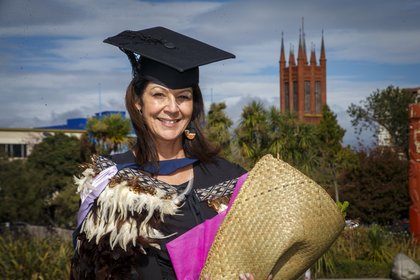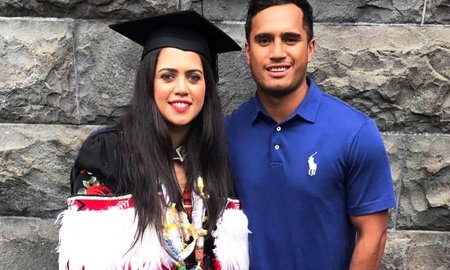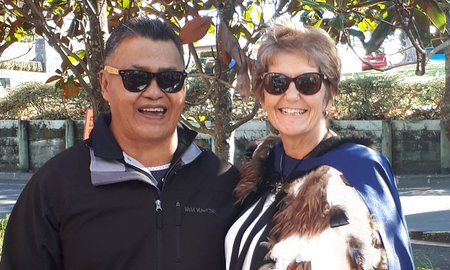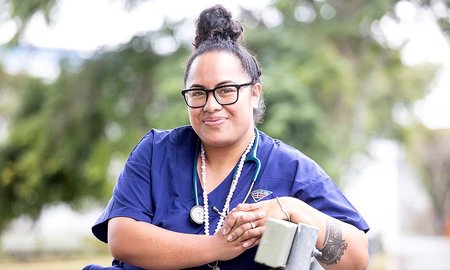
Master of Nursing graduate Tania Bailey, Te Āti Haunui-a-Pāpārangi, Ngāti Rangi, Te Ātiawa, Ngāti Mutunga.
The 54-year-old graduated in Manawatū last week and says while challenging, the hard work was worth it.
“As a single māmā of three boys, it meant finding ways to navigate and balance life, whānau and mahi all whilst studying. There were further complications when I had to put my study on hold because of an injury, but I was able to negotiate with ACC to incorporate it into my treatment plan, one paper at a time. This was the best rehabilitation and perseverance pays off!”
Tania began her nursing journey when she was 18-years-old, working as an enrolled nurse before completing a nursing degree at Waikato Institute of Technology to become a Comprehensive Registered Nurse in the early 90s. Throughout her career, Tania has remained within a clinical role and worked across the health spectrum in both primary and secondary care while attaining an Expert Nursing Professional Portfolio and becoming a registered nurse prescriber.
She started her postgraduate journey at Eastern Institute of Technology before transferring to Te Kunenga ki Pūrehuroa Massey University after moving to Palmerston North. Tania says her journey with Massey has been special.
“I’ve learned that I love research! It’s been a privilege to conduct research with neehi rangatira (Māori advanced practice nurses), to be part of Te Rau Puawai, Te Pūtahi a Toi – School of Māori Knowledge, and have the opportunity to complete this tohu (postgraduate degree) alongside my supervisors. As a tauira Māori, you do not have to feel isolated – there is tautoko (support) and manaakitanga (hospitality, kindness, generosity) from various rōpū Māori (Māori groups) at Massey. Whanaungatanga is everything!”
Tania’s research project involved asking seven Māori Advanced Practice Nurses (APN) around Aotearoa New Zealand the question: ‘Are we culturally safe yet?’ The research explored the current views of kawa whakaruruhau (cultural safety) at individual, organisational and systemic levels.
Tania says the purpose of this question was to understand more profoundly what the barriers and enablers are to implementing cultural safety.
“This research follows on from the formal programme initiated by Dr Irihapeti Ramsden over 30 years ago. The findings have provided valuable information about the support needed for career progression and growth for Māori APNs to work to their full potential.”
Noteworthy findings in the study include highlighting the different and unique pūkenga (skill sets) of Māori APNs, which Tania says positions Māori APNs as key players in addressing existing inequalities within the profession and system.
“Māori APNs hold vital resources to inform Te Aka Whai Ora – Māori Health Authority. One of the biggest challenges faced is how to move beyond simply having knowledge or awareness of cultural safety into operationalising cultural safety. This shift to a more authentic enactment of cultural safety will result in improved outcomes for Māori whānau, health care practitioners and the system as a whole.”
“This research is dedicated to all neehi Māori o Aotearoa to acknowledge their mana and strength to continue to drive for transformative changes in health for our whānau, ngā iwi Māori,” Tania says.
Tania is now working on publishing her research report which has implications for further research to guide policy and strategies for cultural safety in nursing and other health professions. She is also considering a PhD pathway to continue her lifelong study and says she hopes to both see and help implement real change.
“I hope to see a full critical review of the nursing system in Aotearoa, with strategies to grow and strengthen the Māori nursing workforce. We need to grow and support our own nurses as an over-reliance on overseas nurses is unsustainable.”
Tania has recently switched from clinical practice as a Registered Nurse at He Puna Hauora to a research assistant role for a Kaupapa Māori organisation. She is also now a Pou a Rongo (mentor) for Te Rau Puawai, having been a recipient of a Te Rau Puawai scholarship herself.
Tania says support is everything when it comes to undertaking study.
“I’m extremely grateful for the tautoko, not only in the financial sense but being able to study with and draw support from other Māori health professionals and academics – being Māori with other Māori.”
She encourages current and future Māori tauira to ensure they seek similar foundations.
“Study is a commitment, but know there is support at Massey. Do your due diligence and plan your pathway, kōrero with someone who has or is studying the same course, kōrero to tutors and find out if any scholarship programmes would suit you. Find other Māori – there is a whole new whānau waiting there to tautoko you!”
Tania says she’s incredibly thankful for her own support system.
“It’s been a privilege to work with my supervisors, Distinguished Professor Graham Hingangaroa Smith, Dr Kerri-Ann Hughes and Dr Jeremy Hapeta. Ngā mihi nui koutou katoa for your tautoko, guidance and belief in me. To my whānau whānui, aku tama tane: Weraroa, Raniera and Wiari – thank you for keeping the home fires burning. To my hoamahi (workmates) at He Puna Hauora and ‘Team Tania’: Janice Harrington, Matt Ward, Charlotte Bruce and Nici Scott-Savage, thank you for holding this space for me as I made my way back to Te Ao Marama. Thank you Te Ropū Ohu Rangahau. I’d also like to express my immense gratitude and admiration to the seven rangatira Māori Advanced Practice Nurses who shared their pūrākau (story), their mamae (pain) and their aroha with me.”
Related news
Studying for change in Māori and Pacific mental health services
When Chloe Maeva, Ngāi Takoto, Ngāti Kuri, Te Rarawa, began her first role after completing a Bachelor of Nursing, she found the inequities in mental health services unacceptable, especially for Māori and Pacific communities.

Holistic approach to nursing comes full circle
The road to become a mātangi tapuhi (nurse practitioner) has been a long but exceptional one for Kate Te Pou, spanning more than two decades.

Massey graduate is Wellington’s first Pacific Nurse Practitioner
Catherine Tu'akalau is Wellington's first Pacific Nurse Practitioner and one of only a handful in Aotearoa New Zealand specialising in child health.
